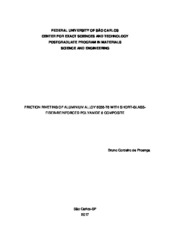| dc.contributor.author | Proença, Bruno Cordeiro de | |
| dc.date.accessioned | 2018-04-03T19:27:35Z | |
| dc.date.available | 2018-04-03T19:27:35Z | |
| dc.date.issued | 2017-08-11 | |
| dc.identifier.citation | PROENÇA, Bruno Cordeiro de. Friction riveting of aluminium alloy 6056-T6 with short-glass-fiber-reinforced polyamide 6 composite. 2017. Dissertação (Mestrado em Ciência e Engenharia de Materiais) – Universidade Federal de São Carlos, São Carlos, 2017. Disponível em: https://repositorio.ufscar.br/handle/ufscar/9654. | * |
| dc.identifier.uri | https://repositorio.ufscar.br/handle/ufscar/9654 | |
| dc.description.abstract | Friction Riveting (FricRiveting) is a relatively new joining technique for metal-polymer hybrid structures. This master thesis was carried out to investigate the FricRiveting process for polyamide 6 reinforced with 30 wt% short glass fiber (PA6-30GF) and aluminum alloy 6056-T6. These materials were selected because of their current joint use in automotive structures. AA6056-T6/PA6-30GF friction-riveted joints were successfully produced. Peak temperatures monitored for the process achieved between 323 °C and 399 °C leading the plastic deformation and thus anchoring of the rivet. The metallic rivet had its microstructure changed during the process, with dynamic recovery and recrystallization being observed in the anchoring zone. Microhardness in the metallic rivet decreased by 40 % of the base material hardness in the anchoring zone, due to a possible dissolution of the precipitates in the aluminum matrix and dynamic recovery and recrystallization. Polyamide 6 degradation was investigated by viscosity measurements and ATR/FT-IR, the joint with the highest level of degradation showed a reduction of 19 % on viscosity average molecular weight and an increase of 2.4 % of the carbonyl index in relation to the base material. Despite this reduction of properties, the friction-riveted joints had a good mechanical performance under tensile loading. Two joining conditions fractured through the metallic rivet outside the composite plate, achieving 92 % of the ultimate tensile strength of the metallic rivet. The influence of the process parameters on the process temperature, viscosity average molecular weight and ultimate tensile force were studied through Box-Behnken Design of experiment, response surface methodology and analysis of variance. Regression equations for these responses were estimated and validated, and an optimized condition was selected. Post joining heat treatment was performed on the optimized joining condition, resulting in an increase of the joint ultimate tensile force up to 99 % of the metallic rivet ultimate tensile force. The durability of the optimized joint was evaluated through natural weathering. An expected negative effect of weathering on the joint ultimate tensile force was observed, strength decrease of 8.4 % after 6 months and 15.5 % after 12 months of exposure. | eng |
| dc.description.sponsorship | Conselho Nacional de Desenvolvimento Científico e Tecnológico (CNPq) | por |
| dc.language.iso | eng | por |
| dc.publisher | Universidade Federal de São Carlos | por |
| dc.rights.uri | Acesso aberto | por |
| dc.subject | Juntas híbridas | por |
| dc.subject | Rebitagem por fricção | por |
| dc.subject | Poliamida 6 | por |
| dc.subject | AA6056-T6 | por |
| dc.subject | Hybrid Joints | eng |
| dc.subject | Friction Riveting | eng |
| dc.subject | Polyamide 6 | eng |
| dc.title | Friction riveting of aluminium alloy 6056-T6 with short-glass-fiber-reinforced polyamide 6 composite | eng |
| dc.title.alternative | Rebitagem por fricção de liga alumínio 6056-T6 em compósito de poliamida 6 reforçada com fibra de vidro curta | por |
| dc.type | Dissertação | por |
| dc.contributor.advisor1 | Canto, Leonardo Bresciani | |
| dc.contributor.advisor1Lattes | http://lattes.cnpq.br/7287108960864123 | por |
| dc.contributor.advisor-co1 | Amancio Filho, Sergio de Traglia | |
| dc.contributor.advisor-co1Lattes | http://lattes.cnpq.br/7609614295379921 | por |
| dc.description.resumo | A Rebitagem por Fricção é uma técnica relativamente nova para união de estruturas híbridas metal-polímero. Esta dissertação de mestrado foi desenvolvida para investigar a utilização da técnica com poliamida 6 reforçada com 30% fibra de vidro curta em peso (PA6-30FV) e liga de alumínio 6056-T6, materiais comumente utilizados na indústria automobilística. As juntas rebitadas por fricção foram produzidas com sucesso. As temperaturas processuais variaram entre 323 °C e 399 °C, isso possibilitou a deformação plástica do rebite e consequentemente sua alteração microestrutural. A microdureza na zona de ancoragem do rebite metálico diminuiu 40 % em relação ao material base, devido a uma possível dissolução dos precipitados na matriz de alumínio e também devido à recuperação e recristalização dinâmica. A degradação da PA6 foi investigada por viscosimetria e ATR/FT-IR mostrando uma redução máxima de 19 % no peso molecular viscosimétrico médio e um aumento de 2,4 % do índice de carbonila em relação ao material de base. Mesmo com a redução nas propriedades, as juntas tiveram um bom desempenho mecânico, atingindo 92% da força máxima de ruptura do rebite metálico e tendo a falha no rebite metálico exterior a placa de material compósito. A influência dos parâmetros do processo sobre a temperatura do processo, o peso molecular viscosimétrico e força máxima de tração foram estudadas através do planejamento de experimento Box-Behnken (BBD), superfície de resposta e análise de variância. Equações de regressão para essas respostas foram estimadas e validadas, uma condição otimizada foi selecionada. Com essa junta foi realizado um tratamento térmico após a união, isso aumentou a resistência da união para 99 % da força máxima de ruptura do rebite metálico. A durabilidade das juntas foi avaliada por ensaio de intemperismo natural. Os efeitos sobre a força máxima de tração foram negativos, decréscimos de 8,4 % após 6 meses e 15,5 % após 12 meses. | por |
| dc.publisher.initials | UFSCar | por |
| dc.publisher.program | Programa de Pós-Graduação em Ciência e Engenharia de Materiais - PPGCEM | por |
| dc.subject.cnpq | ENGENHARIAS::ENGENHARIA DE MATERIAIS E METALURGICA::MATERIAIS NAO METALICOS | por |
| dc.ufscar.embargo | Online | por |
| dc.publisher.address | Câmpus São Carlos | por |
| dc.contributor.authorlattes | http://lattes.cnpq.br/3022309813467318 | por |
